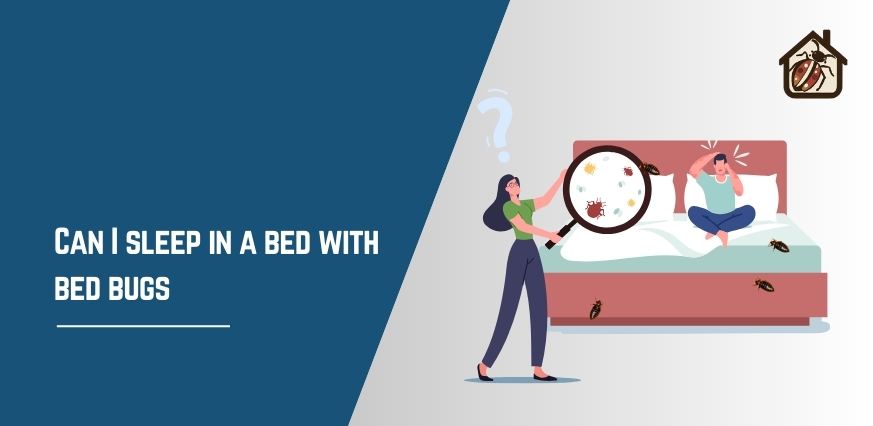
Can I sleep in a bed with bed bugs
It can be upsetting to find bed bugs in your bed, and you may worry right away about whether it is safe to stay in the contaminated bed and whether it is practical to do so. Even if it’s not ideal to have these unwanted guests in your bed, it’s important to know the hazards and look into other options. Below is a detailed explanation of the dangers and available options:
What are the risks of sharing your bed with bed bugs?
Bites and Welts
Cimex lectularius, the technical name for bed bugs, are parasitic insects that have a predilection for feeding on human blood. Their nighttime antics can result in painful, itchy bites that get worse if you scratch them. Even though these bites don’t usually constitute a health risk, they are nevertheless a big annoyance and can interfere with getting a good night’s sleep. Living with these tiny, bloodsucking pests in your home is already a frightening experience; add to that the constant itching and possible suffering from bed bug bites.
Psychological Stress
Finding out that your bed is bug-infested might set off a chain reaction of anxiety and mental strain. Knowing that your sacred sleeping area is violated can have a significant psychological impact. Even just thinking about sleeping in the same bed as bed bugs can cause stress, which may then show up as trouble getting to sleep or staying asleep. Your bedroom, which should be a haven of comfort, might become a source of mental anguish as a result of your ongoing knowledge of the infestation.
Spreading the Infestation
The temptation to relocate to a different sleeping location could seem reasonable to get out of the bed bug-infested one. But this seemingly harmless action may unintentionally make the situation worse. Renowned hitchhikers and bed bugs are skilled at attaching themselves to garments, linens, or personal belongings. As a result, switching to a new bed or room could inadvertently encourage bed bugs to spread to other parts of your house. The act’s unexpected repercussions may make the infestation’s removal more difficult and time-consuming.
How can you avoid sleeping with bed bugs?
Protective Clothing
Taking action becomes essential when you have to deal with the disagreeable reality of having bed bugs in your bed. Wearing protective gear strategically is one such precaution. Ideally, choose pajamas made of tightly woven fabric that offer ample coverage.
This option reduces the amount of time that bed bugs come into direct touch with your skin by erecting a physical barrier against bites. It’s not a perfect answer, but it provides an extra line of protection and some relief from the ongoing danger of bites at night.
Barrier Creams
Using barrier creams becomes another possible tactic in the fight against bed bugs. Apply insect repellents or natural substitutes, such as citronella oil, on exposed skin. It’s important to remember that these precautions have limits even though they offer some protection.
Barrier creams have varying degrees of efficiency and are not always effective. But when combined with other preventative steps, they form part of a comprehensive strategy meant to lessen the effects of bed bug bites.
Frequent Bedding Washing
Regular and thorough cleaning of bedding is an essential part of managing a sleeping environment contaminated by bed bugs. Do a daily laundry load of sheets, pillowcases, and pajamas. Use hot water (140°F) and high heat to dry them. This methodical washing process accomplishes two goals.
First of all, it lessens the chance of bites during the night by eradicating bed bugs and their eggs. Second, it helps with overall mitigation efforts by interfering with bed bugs’ capacity to reproduce and spread by upsetting their lifecycle.
Monitoring Bites
A tactical way to deal with the difficulties of living with bed bugs is to keep a close watch on the places and intensity of bites. Note the locations and intensities of the bites on your body and keep a record of them. When using expert pest control services, this information is priceless.
A comprehensive understanding of the degree of the infestation facilitates the development of a focused and successful treatment plan, improving the overall approach to managing these nocturnal visitors.
Priority on Professional Pest Control
Professional pest management is, without a doubt, the cornerstone of a long-term cure to a bed bug problem. Expert action must be prioritized as soon as the existence of bed bugs is verified. To address every facet of the bed bug infestation, professional pest control services bring a wealth of knowledge, specialized treatments, and a tailored strategy.
This all-encompassing approach guarantees the total elimination of bed bugs, offering a sense of relief and reclaiming your bed as a haven for restful, undisturbed sleep.
You may also like:
- Can I get rid of bed bugs by building a moat around my bed
- What is the first thing to do after finding out bed bugs in your room
- How do you stop bed bugs from spreading to other rooms
FAQs
What are the risks of sharing your bed with bed bugs?
How can you avoid sleeping with bed bugs?
What is the significance of protective clothing in bed bug prevention?
Can barrier creams effectively prevent bed bug bites?
Why is frequent bedding washing crucial in managing bed bug infestations?
How does monitoring bites aid in managing a bed bug infestation?
Why is professional pest control prioritized for bed bug eradication?
What is the ultimate solution for enduring tranquility and a bed-bug-free environment?
Can I sleep in a bed with bed bugs
Conclusion
Navigating interim solutions in the face of a bed insect infestation may be inevitable, but it’s important to understand their limitations. Expert pest management holds the key to enduring tranquility and a bed bug-free atmosphere. Taking prompt action to hire professionals guarantees bed bug eradication in its entirety and creates safeguards against future infestations. Take back your bed, get your head back on track, and spend money on a pro-rated strategy to ensure that your house is always a haven of sound sleep.


